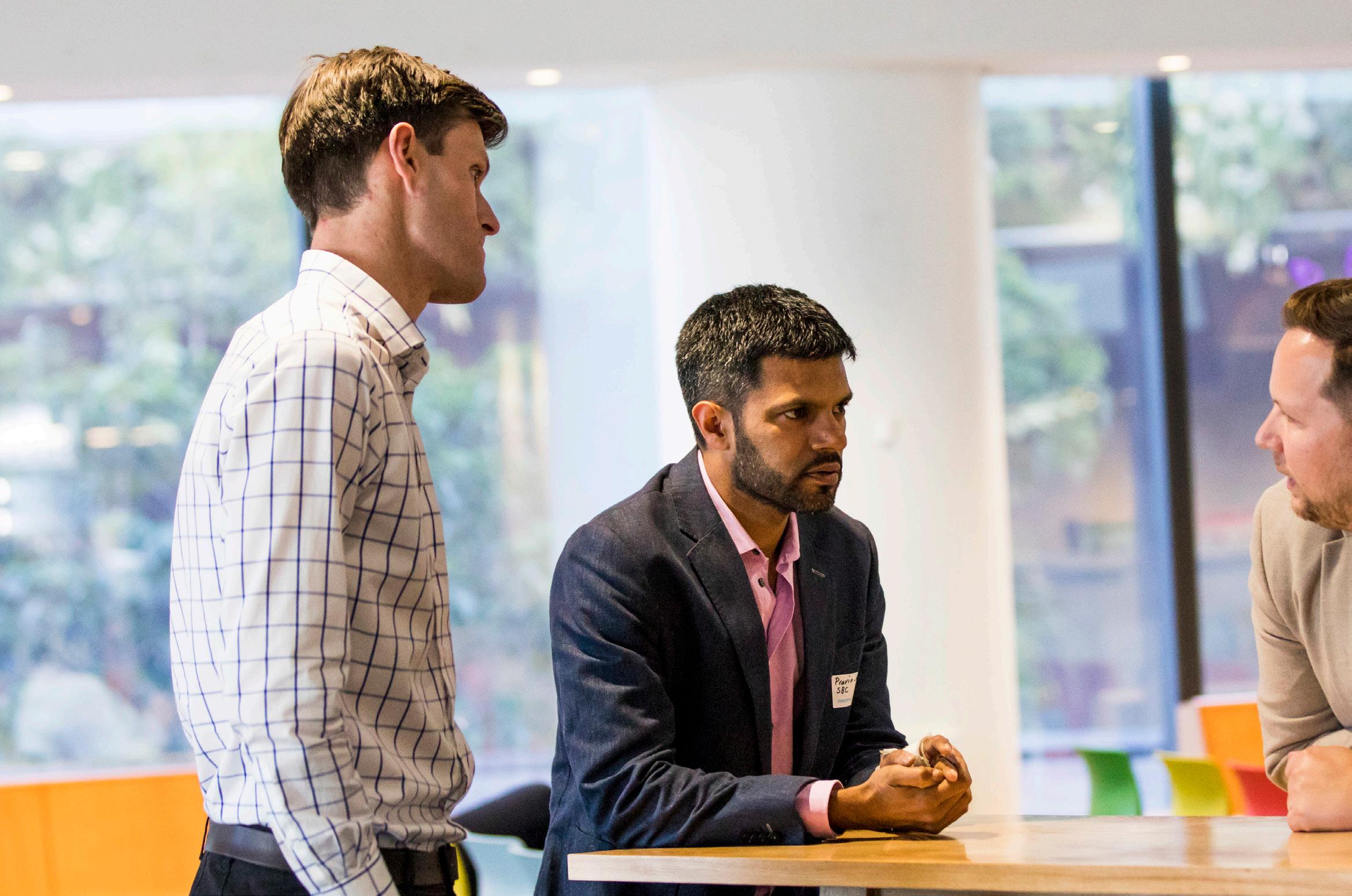
8 minute read
Putting people at the heart of sustainability and good business
Robert Perry, Sustainable Leadership Manager at the Sustainable Business Council (SBC), shows how businesses that choose to put sustainability at the heart of their purpose prove their commitment to doing good for people, as well as the planet and profit.
Adecade ago, sustainability was a non-issue for directors, executives and shareholders. CEOs rarely talked about ‘purpose’, their sights set solely on maximising profits and continued growth.
Fast-forward to today and business is on a completely different trajectory.
The Institute of Directors has just released its Top Five Issues for Directors in 2020, and on top of the list is climate action. There has been a global shift in expectations with shareholders demanding more than financial returns from their investments.
Last year, 3.5 per cent of our population marched the streets calling for climate change action. This is a rising trend, and every sector, every employer and every demographic in society is now being affected. We all have a part to play.
So where to from here? Let’s start with tangible proof of sustainability progress before moving on to how your company can make progress. Here are some positives:
• more than 100 business leaders have signed up to the Climate Leaders Coalition – setting bold goals to reduce their carbon footprint and report on progress
• the Government’s Zero Carbon Bill passed with near unanimous cross-party support
• major news companies report daily on climate change, making commitments to improve coverage
• many companies have taken significant steps to move beyond waste minimisation to embrace the benefits that a circular economy brings – by starting to think about how to support their employee transition to new ways of doing things and new technologies.
It’s clear that demand is growing for climate action and broader sustainability across the board.
Just released, this year’s Colmar Brunton Better Futures report shows that climate change, sustainability and waste remain key concerns for New Zealanders.
You can find out more about the results at www.sbc.org.nz/ news/2020/kiwi-youth-feelingthe-heat.
We’re seeing similar trends in impact investing, which has recently surged globally. Impact or responsible investing aims to produce social and environmental benefits as well as a financial return. It includes green bonds, social bonds, social enterprise, ethical funds management and strategic philanthropy.
The Global Impact Investing Network estimates the current size of the global impact investing market to be US$502 billion. But can this change really be good for business, or is it all rhetoric?
Looking to the future, the Colmar Brunton Better Futures report also highlights that 72 per cent of youth say it’s important their future employer is socially and environmentally responsible, indicating workplaces with these values are more likely to attract talent.
Companies that have strong employee value propositions have a competitive edge when it comes to attracting new talent, as well as increased engagement with current employees. Happy staff generally leads to improved outcomes.
At SBC, we are seeing an increasing number of our members working with their employees to find new and innovative ways to reduce emissions and improve their social impact not only in the business but also at home.
A new wave
Collectively, SBC members employ 158,000 full-time equivalent staff, representing a considerable opportunity to influence action on sustainability issues like climate change, diversity and inclusion and the future of work. Businesses that choose to put sustainability at the heart of their purpose prove their commitment to doing good for people as well as the planet and profit. This responsibility calls for a strengthened social contract that goes beyond the wellbeing of employees, to managing the broader impacts on the society of which they are a part.
How businesses lead and navigate these complex issues will be critical to maintaining and strengthening their social licence to operate as well as holding themselves to higher ethical standards. HR and people teams play an important role in recruiting, training and rewarding individuals to succeed in this context. Beyond Business founder and HR expert Elaine Cohen says, “the true role of the HR professional is to help convert the sustainability impacts of an organisation on employees into positive sustainability impacts of employees.”

Cohen asserts that including employees in the sustainability process can have ripple effects due to the influence of their work and their multiple daily interactions with internal and external stakeholders.

An employee’s work and interactions have the potential to advance an organisation's sustainability goals.
Incorporating sustainability in the workplace ties right into the HRNZ competency framework; to be an effective HR practitioner, you need to be skilled in the following five main areas.
• Personal credibility: Build trust and credibility with all major stakeholders.
• Business technology: Understand the general technologies that power the business.
• Business knowledge: Understand how the business works.
• HR delivery: Understand technical HR basics, such as recruitment, performance management, organisational change, and Human Resource Management Information Systems (HRMIS).
• Strategic contribution: Understand how HR policies and practices contribute to the overall performance of the business in the long run. Sustainability leadership is implicit in each competency. None of these competencies can be fulfilled without oversight of the current and emerging issues affecting your organisation’s ability to create value and the associated expectations of your employees and stakeholders.
Practical changes
You can begin by understanding sustainability and what it means to your organisation. Engage with stakeholders to identify your main ‘material’ issues and set goals and commitments to drive improvement. Consider tracking your company’s alignment and contribution to the United Nation’s Sustainable Development Goals. Once your goals are established, management systems and processes will need to guide the implementation of corresponding initiatives. The crucial final step is to monitor progress, communicate actions and deliver on your commitments. Throughout this simplified process, it is essential to ensure staff are engaged to build buy-in and ownership by explaining the importance and benefits of sustainability for the business, your people and wider society.
Your company can also incorporate sustainability into leadership development programmes, to help integrate sustainability into accountabilities throughout your organisation (for example, to offset carbon by 2021). Remember that incentives are a great way to get staff on board. SkyCity created a financial incentive. For every dollar spent by its employees offsetting their emissions, the company puts one dollar towards a Green Fund, which finances emissions reduction projects in the business. Thirty staff have since gone carbon neutral.
Now that so many businesses are measuring their emissions and have started to create emissions reduction plans, the next step is to engage staff and tap into their creativity and know-how. Empower their innovation and leadership.

In the capital, BusinessNZ, New Zealand’s largest advocacy body, is also in the process of embedding sustainable practices into its strategy.
It has reviewed its functions and workplace practices and is in the process of rolling out sweeping changes. It is starting with easy win-wins, including reductions in air travel made possible by new digital meeting technologies, and taking a more progressing approach to policy advocacy by integrating broader sustainability outcomes. The company has been offsetting its carbon for some time but wants to lead the way, as a small and medium-sized enterprise, in taking sustainable action. BusinessNZ has taken the simple but critical step of asking its HR department to break down emissions, making it easier for individuals to measure and take responsibility for reducing their footprint.
Future of work A widely discussed, and sometimes misunderstood, aspect of driving change in the workplace is the future of work (FoW). A common misconception is that this is all about technology – it’s not, it’s also about tangata, tangata, tangata.
The scale and pace of transformation are unprecedented, and its impacts are amplified by its interaction with other socio-economic factors such as shifting demographics, globalisation, and the transition to a sustainable, zero-carbon economy.
FoW will bring challenges for organisational leadership, business models and our workforces. Conversely, FoW signifies an opportunity to develop work in ways that not only enhance productivity and create value but also enable people to thrive in the new realities of work.
However, if the transitions involved are poorly managed, potential risks include widening skills gaps and inequality, and growing uncertainties through increasing job displacement, skills transitions and the casualisation of work. The transitions involved call for urgent, decisive action to seize these opportunities and to mitigate potential risks. Environmental and social issues like climate change, biodiversity loss and FoW are shaping up to be some of the greatest opportunities and challenges for business in our lifetime.
Today’s business leaders need a finely tuned skillset to drive high levels of performance, productivity and value creation amid increasing complexity, uncertainty and profound change. They need transformational strategic thinking, creativity, innovation and personal resilience. They need to shape cross-sectoral collaborations at a scale never seen before and, at times, involving cooperation amongst competitors.
Businesses that put sustainability at their core must take responsibility for people as well as the planet and profit. This responsibility calls for a strengthened social contract that goes beyond caring for the wellbeing of employees to managing the broader impacts on the society of which they are a part.
Key steps for HR professionals to drive sustainability in your organisation:
• Define your company’s social purpose.
• Review your workplace practices to ensure that they are in line with your sustainability goals.
• Make sustainability a crucial part of your recruitment and induction processes.
• Integrate sustainability into leadership development and training.
• Look at quick win-wins by providing tools to help employees be more sustainable.
• Incentivise accountability and nurture ownership by incorporating sustainability goals into job descriptions and performance reviews.
Robert Perry manages the Sustainable Business Council’s Sustainable Leadership programme. This covers mainstreaming sustainable business practices throughout New
Zealand, business leadership, and reframing business with a societal purpose to deliver lasting value for people, profit and prosperity. Robert has worked as a strategist, policy practitioner and auditor providing strategic leadership on sustainability issues and their solutions in business, consultancy and public sector organisations in the United Kingdom, Australia and New Zealand. He was the driving force behind the co-design, governance and citywide delivery of Low Carbon Auckland, which is a 30-year strategy and action plan to drive Auckland’s low carbon economic transformation.










